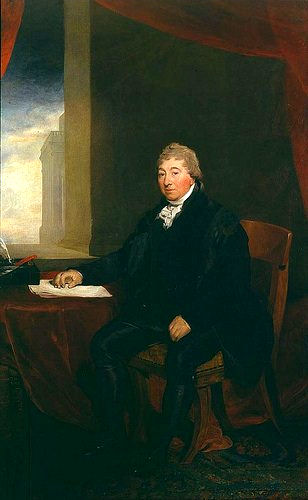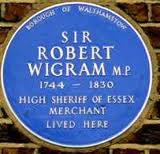THE WIGRAM FAMILY

Robert Wigram was born at Wexford on 30th January, 1743, but he never saw his father who was lost at sea, and he was brought up by his ubcle and mother. In his nineteenth year he set out for London with £200 in his pocket and a letter from his mother to a certain Dr. Allen, both his uncle and his mother being anxious that he should be taught medicine by their friend Dr. Allen. Robert Wigram arrived in London in 1762, and as he did not know a soul in the great city, went off early the following morning to Dulwich, where Dr. Allen lived, in order to present his mother's letter, and in hopes, as he said, of being offered some breakfast.
He arrived at Dr. Allen's about 9 o'clock and was greeted with the worda:-"so, young man, you are come to London. It is a place where, if you fall down, no one will pick you up." But when the boy was leaving, the kindly old doctor softened and said:-"Come any morning you like before 8 o'clock and I will give you some breakfast." This Robert Wigram often did, and used to relate how he hurried across the open ground about Kennington in order not to be late.
Robert Wigram was undoudtedly a boy of unusual character; very shrewd, long sighted and business like, yet he was noted for his generosity.
When quite a boy, having been given a few pence, he once saw a man being carried off to prison for debt. He immediately ran up to the man and offered him the pennies. In after life whenever one of his numerous children was born he made a practice of going and releasing some prisoner confined for debt by paying up for him. And he had such a rare sense of gratitude that he always tried to show acknowledgement in kind for any gift or help from man, and any mercy or blessing from God.
Two years later, thanks largely to the able and careful tutoring of Dr. Allen, Robert Wigram took his diploma, which qualified him to become a ship's surgeon.
Robert Wigram began his sea career in 1764 by signing on the East Indiaman 'Admiral Watson' as surgeon. So started Robert Wigram's eventful connection with the sea, which, first and last, was to cover a periob of 66 years, and to bring him finally to the foremost position in British shipping circles.
The 'Admiral Watson' was a ship of 400 tons. She left Portsmouth on February 20 bound for Bencoolen, in Sumatra, in the Dutch East Indies, and Bengal. The second officer was a man called William Money, and during the voyage he and the young surgeon laid the foundations of a lasting friendship. William Money became one of Robert Wigram's closest friends; Robert Wigram named one of his sons - Money Wigram - after this second officer with whom he had been shipmates, and later on, when Wigram became a shipowner, William Money joined him as a business associate in part-ownership. In November, 1766, the 'Admiral Warson' returned home after two years. Robert Wigram had completed his first sea voyage. He made two more voyages as surgeon. The first of these was made in 1768 in the East Indiaman 'Duke of Richmond'. She sailed for Bencoolen, and arrived home in the following year. In 1770 Robert Wigram left on his final voyage in the East Indiaman 'British King', bound for Bencoolen and China. While in China during the following year Robert Wigram contracted ophthalmia, injuring his eyesight to such an extent that further work as a surgeon was out of the question. Consequently, when the 'British King' arrived home Robert Wigram left the sea.
He was now 28 years old. He had spent the last eight years at sea, but he had learnt his job and he had invested his savings prudently. The capital of £200 with which he had left Wexford 10 years earlier had by now increased to £3,000. He had gained an excellent knowledge of medicines and drugs during his voyages to the East, and he therefore decided to start on his own as a drug merchant in London, where the Dutch and Germans at that time bought most of their wholesale supplies. He invested the whole of his capital in the business.

Like most of the London merchants of his day, Robert Wigram had lived for many years in the City, but in 1782 he moved to Walthamstow House. Here he was able to enjoy with his family the pleasures of country life, and as his sons grew up they were able to accompany him on horseback to the City. So for the next six years Robert Wigram continued to lead the daily round of a London drug merchant's life, and then in 1788 he had to face another, and perhaps the most eventful, crisis in his career, when he decided to become a shipowner. Once more the question of capital required for the new venture arose, and he made up his mind to risk the whole of the spare capital that was not actually needed for his merchant business. He would keep on his present office. He would still remain in the drug trade. Those Dutch and German buyers might prove a useful source of revenue in the event of his finding it difficult to find employment for his ships. He would have two businesses - drugs and ships. His eggs should not be all in one basket; his bow was not to be a one-stringed affair. Thus he became an early exponent of the policy, adopted by many later shipowners, of having outside investments.
Robert Wigram entered Parliament in 1802, and was created a baronet in 1805.
In 1803 he was one of the initial subscribers in the East India Dock Company, later becoming a director.
In February 1805 John and William Wells sold they yard to Robert Wigram, though they retained an interest in the business.
In 1805 Sir Robert Wigram bought a large share and the firm became Wigram, Perry, Wells & Green.
1806. In January and May, Sir Robert Wigram's two son's, Money and Henry Loftus, came to reside in the Yard, at the repective ages of sixteen and fifteen.
1812. On the 3rd of March, Sir Robert Wigram's son, John, was killed at Walthamstow by a fall from his gig.
On the 12th of August the whole of the Blackwall Tard estate became vested in Sir Robert Wigram. At this time, Mr. William Wells having retired, the partners in the firm were Sir Robert Wigram, holding four-sixteenth shares, Mr. George Green, holding four-sixteenth shares, and Mr. John Wigram, holding two-sixteenth shares.
Money and Henry Loftus Wigram were now brought into the business in place of their late brother.
1813. Mr. John Wells had retired and disposed of his quarter of the business to Sir Robert Wigram, and the partners in the firm of Wigrams & Green were Sir Robert Wigram, holding one-half, George Green, one-quarter, and Money and Henry Loftus Wigram, one-eighth each.
1819. On the 23rd of August Sir Robert Wigram retired from active business and sold the whole of the Blackwall Yard estate to George Green, Money Wigram, and Henry Loftus Wigram for £40,500. Mr. Green taking half and the two Messrs. Wigrams a quarter each.
1822. Henry Green, the second son of Mr. George Green, entered the Yard as an apprentice to his father as a shipwright, at the age of fourteen.
1829. Richard Green, the eldest son of Mr. George Green, was admitted into partnership at the age of twenty-six, and undertook the management of the ships belonging to his father and the firm.
1831. Henry Green became a partner in the business at the age of twenty-three, when the shares were held as follows:- George Green - two-twelfths, Money Wigram - three-twelfths, Henry Loftus Wigram - three-twelfths, Richard Green - two-twelfths, Henry Green - two-twelfths.
1838. Mr. George Green retired from active business.
1843. The Green - Wigram partnership expired and the Yard and ships were divided.
The western portion with the house and entrance was made over to the newly created firm of Messrs. Money Wigram & Son's, and the eastern portion with a sum of money and another entrance was apportioned to that of Messrs. Richard & Henry Green.
The Children of Sir Robert Wigram.
1. - Sir Robert Fitz-Wygram. b.25th Sept 1773 d.17th Oct 1843. 2. - Francis Wigram. b.16th Aug 1774 d.14th Sept 1774. 3. - Catherine Wigram. b.21st Aug 1775 d 22nd Sept 1865. 4. - John Wigram. b.2nd Jan 1778 d.23rd March 1812. 5. - William Wigram. b.23rd July 1780 d. 8th Jan 1858. 6. - Maria Wigram. b.26th March 1782 d.13th Jan 1873. 7. - Eleaner Wigram. b.1st July 1788 d.16th Jan 1812. 8. - Money Wigram. b.14th March 1790 d.24th March 1873. 9. - Henry Loftus Wigram. b.20th July 1791 d.25th June 1866. 10. - Harriet Wigram. b.14th Aug 1792 d.16th July 1823. 11. - Sir James Wigram. b.5th Nov 1793 d 29th July 1866. 12. - Octavius Wigram. b.18th Dec 1794 d 20th May 1878. 13. - Anne Wigram. b22nd Feb 1796 d21st May 1863. 14. - Charles Laird Wigram. b.12th April 1797 d.16th June 1874. 15. - The Rt. Eev. Joseph Cotton Wigram. b.26th Dec 1798 d.6th April 1867. 16. - Richard Wigram. b.1st April 1800 d.24th April 1819. 17. - Ely Duodecimus Wigram. b.16th Sept 1801 d.12th Oct 1869. 18. - Edward Wigram. b.30th Sept 1802 d3rd Dec 1870. 19. - Loftus Tottenham Wigram. b.6th Nov 1803 d.19th Sept 1889. 20. - George Vicesimus Wigram. b.28th March 1805 d.1st Feb 1879. 21. - Rev. William Pitt Wigram. b.2nd Dec 1806 d.18th Sept 1870. 22. - Arthur Wells Wigram. b.7th April 1810 d.2nd June 1811. 23. - Anna Maria Wigram. b.20th Jan 1812 d.11th March 1856.
